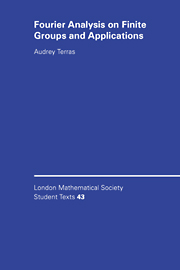Part I - Finite Abelian Groups
Published online by Cambridge University Press: 06 July 2010
Summary
It is unfortunate that so many scientists have been conditioned to believe that, say, 1030 particles can always be well approximated by an infinite number of points.
D. Greenspan [1973]In this age of computers, it is very natural to replace the continuous with the finite. One thinks nothing about replacing the real line ℝ with a finite circle (i.e., a finite ring ℤ/nℤ) and similarly one replaces the real Fourier transform with the fast Fourier transform (FFT). Then computers become happier about our computations. Moreover, the prerequisites for our book become much less formidable than they were for our earlier volumes on harmonic analysis on symmetric spaces (Terras [1985, 1988]). In fact, some (such as Greenspan [1973]) might arguethat, since the universe is finite, it is more appropriate to use finite models than infinite ones. Greenspan decides to “deny the concept of infinity” despite feeling “unmathematical” and “un-American” in doing so. Physicists have also begun considering dynamicalsystems over finite fields (see Nambu [1987]).
Here our goal is to consider finite analogues of the symmetric spaces such as ℝn and the Poincaré upper half plane, which were studied in Terras [1985, 1988]. We will discover finite analogues of all the basic theorems in Fourier analysis, both commutative and noncommutative, including the Poisson summation formula and the Selberg trace formula. One motivation of this study is to develop an understanding of the continuous theory by developing the finite model.
Information
- Type
- Chapter
- Information
- Publisher: Cambridge University PressPrint publication year: 1999
